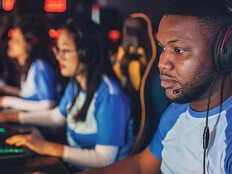What should the initial plan include?
The plan should specifically address the following key areas:
- Purpose – Who is it for and it how will it contribute to the campus community?
- Funding – Where will financial support for the program come from?
- Space – Where are your practice and tournament facilities?
- Scalability and sustainability – How will this program become a permanent piece of your university landscape?
- Leadership – Who are the faculty or staff, specifically, that will provide oversight of the program?
- Varsity status – How does your program go beyond a student-led club, and instead, require university-recognized varsity status?
Who should run the esports program?
Many universities now have a varsity program, so consider using a model currently in place from a program at a sister school. As to where it should be housed, consider what departments may be best equipped to host the team, in that they may:
- Be able to approve requisitions faster, with fewer channels of approval
- Have self-support academic models already in place
- Have scholarship structures already in place
- Have scholarly activities around esports activities
- Serve as job market preparation units for professional activities in esports
What kind of leadership tasks need to be established?
Because you are creating a varsity program, there are several ongoing duties that require full-time attention. We recommend splitting up duties among multiple roles, such as having a general manager, arena manager and coach. The GM will be in charge of student eligibility, programmatic oversight and university relationships. The arena manager will be in charge of technical operations, equipment and scheduling. The coach will need to organize and create teams and strategies to effectively compete. These positions are challenging and, if short-staffed, can be overwhelming for a single person to do well.
What is the future of college esports?
We get asked this question quite often, and we mostly agree on a few directions in which varsity esports is headed. National governing bodies and organizations will continue to develop, which should eventually assist schools in creating their own best-fit competitions and schedules. More game titles will emerge with leagues for competition, and more traditional sports-themed games will be adopted. We hope the trend is to accept more fantasy-related titles with T-ratings, drawing the line at fantasy violence rather than simulated violence. And as the world of esports continues to grow, we expect more media coverage and interest in what universities are accomplishing in this burgeoning field.












